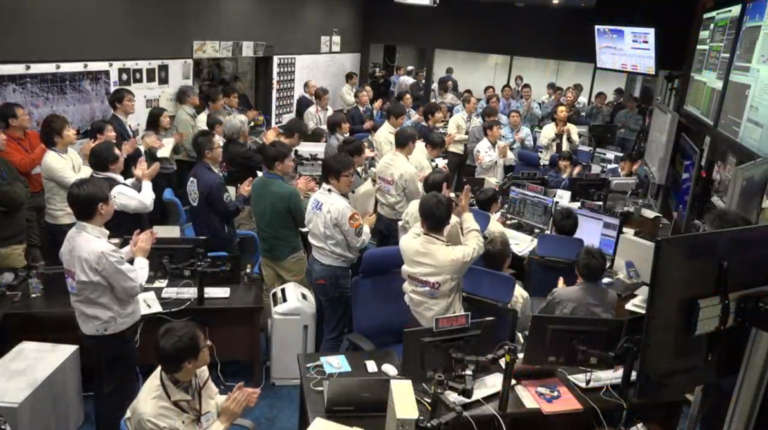Jason Davis • Feb 21, 2019
Hayabusa2 has touched down on Ryugu!
Japan's Hayabusa2 spacecraft has successfully touched down on the surface of Ryugu! The touchdown happened about 35 minutes earlier than expected, catching even some of the project scientists off-guard. During a live broadcast from JAXA's control room in Sagamihara, cheers suddenly erupted, causing some initial confusion about whether Hayabusa2 had actually touched down. Soon afterward, via a superb Japanese-to-English translator who narrated the broadcast, a JAXA scientist reported, "There was some deviation from the simulation graph, but the results are that everything went according to plan."
Hayabusa2, Japan's mission to Ryugu and other asteroids
Hayabusa2 traveled to the asteroid Ryugu, deployed rovers on its surface, and brought samples back to Earth.
News brief
The descent to Ryugu began on 21 February at 4:45 UTC, a delay of about 5 hours later than initially planned. The reason for the delay wasn't clear, but mission controllers made up for lost time by sending Hayabusa2 towards Ryugu at a speed of 90 centimeters per second instead of 40. Around the same time, images from the spacecraft's optical navigation cameras started coming in, and continued to do so until the spacecraft crossed beneath 200 meters shortly after 22:02 UTC.

At the 45-meter hold point, Hayabusa2 oriented itself for landing and turned its high-gain antenna away from Earth, shutting off the flow of telemetry in the process. From there, mission controllers could only watch for Doppler shifts in the signal from Hayabusa2's low-gain antenna, indicating the spacecraft had pushed its sample horn into Ryugu and was starting to ascend.
That shift occurred around 22:49 UTC:
[TD1-L08E1] 2/22 at 7:49 JST. The Doppler data showed the behavior as expected and cheers went up with a clap!
— HAYABUSA2@JAXA (@haya2e_jaxa) February 21, 2019
A cheer erupted at JAXA's mission control center:

Hayabusa2 began to ascend, and just minutes later was able to swing its high-gain antenna back toward Earth. Mission controllers confirmed that the spacecraft was healthy and the command to fire the tantalum bullet executed as expected.
The next step will be for JAXA to download imagery, particularly from the camera on the sample horn, and further confirm the touchdown sequence went as planned. We'll continue to update this article!
Support our core enterprises
Your support powers our mission to explore worlds, find life, and defend Earth. You make all the difference when you make a gift. Give today!
Donate

 Explore Worlds
Explore Worlds Find Life
Find Life Defend Earth
Defend Earth


